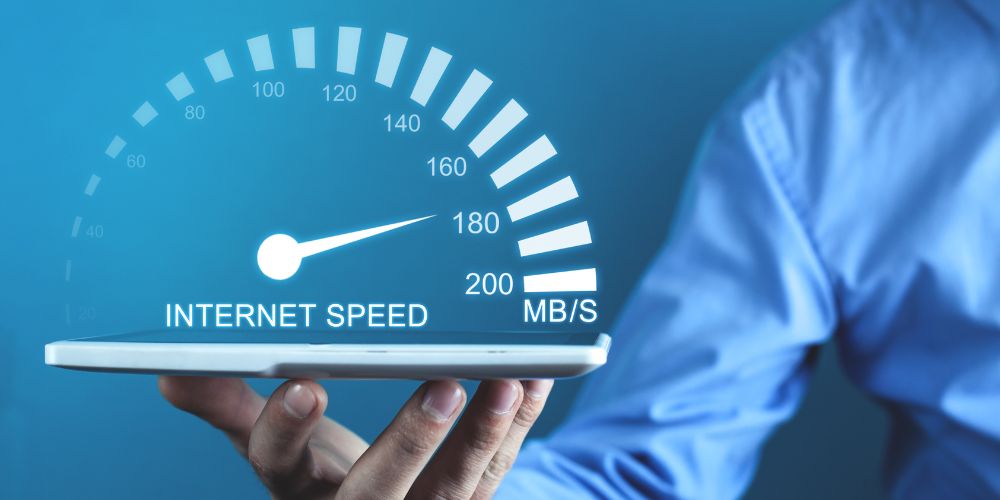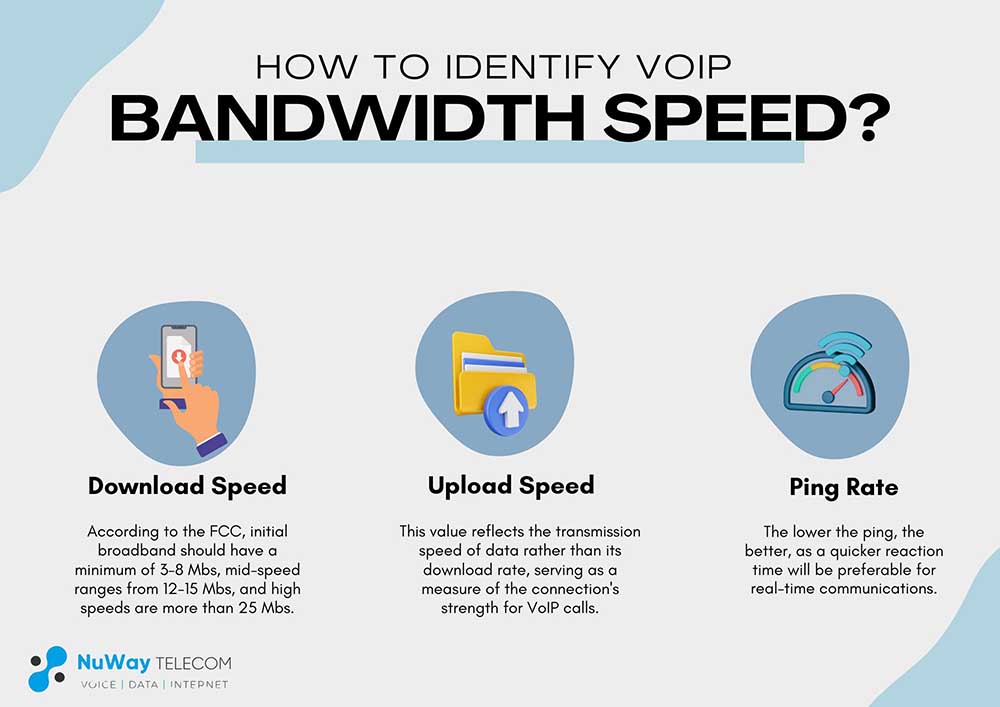
Voice over Internet Protocol technology has drastically transformed telephony communications by allowing voice calls over the Internet instead of ordinary phone lines.
VoIP technology works by converting voice sounds into digital data packets. The sender transmits these over the Internet to the intended recipient. The technology deviates from regular telephony, which operates from copper wires set aside for telephone calls.
Instead, VoIP uses broadband internet connections, and this article will explain in-depth how VoIP technology works and the importance of internet speed on voice transmission quality.
How Much Bandwidth Does VoIP Require?
To ensure clear calls, allocating a minimum of 100 kbps for both upload and download bandwidth is advisable. A 1-megabyte connection is sometimes assumed to be sufficient for ten VoIP phones, which needs to be corrected.
Ten high-quality VoIP calls concurrently require at least 1 megabyte of dedicated bandwidth, with additional bandwidth reserved for activities such as CRM use, webinars, or listening to music.
Major carriers provide gigabit speeds to companies, but a single DSL or fiber connection is usually sufficient for small businesses. To reduce network congestion and bandwidth, segregate VoIP phones from the primary LAN using a separate network switch or VLAN, especially in large offices or call centers.
However, speed is only one of the requirements; a stable, high-quality connection with minimal packet loss and latency is crucial. Data transmission and reception latency directly impact audio delay, while packet loss diminishes audio quality and call stability. Assessing internet health via a VoIP speed test can reveal issues like latency and jitter, necessitating a discussion with the Internet Service Provider (ISP) to resolve them.
Minimum Internet Speed Recommendations
As per FCC guidelines, VoIP systems typically necessitate internet speeds below 0.5 Mbps for downloads, which may seem low but are adequate. Comparatively, streaming YouTube videos requires 3 to 4 Mbps, while social media browsing utilizes 1 Mbps. If your connection supports these activities, it’s sufficient for VoIP.
Additionally, the requisite internet speed for VoIP can vary based on concurrent call volume. For instance, 1 to 3 simultaneous calls require 100 kbps to 500 kbps download speeds. As call volume increases, so does the demand for internet speed to maintain call quality.
Furthermore, the bandwidth requirements may differ depending on the VoIP provider’s technology, with leading providers typically offering tailored recommendations for optimal performance.
Determining Required Bandwidth for VoIP
To assess your bandwidth, utilize an online speed test or explore the network interface settings on your office devices. For example, in Windows Task Manager, navigate to Performance and select the network interface (e.g., Wi-Fi) to view the device’s bandwidth. Larger organizations might employ monitoring software to monitor bandwidth usage.
Determining your bandwidth requirements is straightforward with this formula:
Upload Speed * 1000 = Y Kbps
Y Kbps / 445 = number of phone lines your bandwidth can support
For example, if your internet upload speed is 75 Mbps, then here’s how the formula looks:
75 x 1,000 = 7,500
7,500 / 445 = 16.85Thus, an upload speed of 75 Mbps could support up to 16 VoIP telephones.
How to Identify VoIP Bandwidth Speed?

Providers often promise certain speeds when purchasing internet service, but these figures may need to reflect your connection accurately. Conduct an internet speed test using the provider’s app to determine your internet speed and assess VoIP bandwidth suitability.
For the VoIP internet speed, the following three primary metrics will effectively determine the quality of service:
- Download Speed: This represents how much data can be pulled from the internet and varies. According to the FCC, initial broadband should have a minimum of 3-8 Mbs, mid-speed ranges from 12-15 Mbs, and high speeds are more than 25 Mbs.
- Upload Speed: This value reflects the transmission speed of data rather than its download rate, serving as a measure of the connection’s strength for VoIP calls.
- Ping Rate: This is the reaction time measured in milliseconds. The lower the ping, the better, as a quicker reaction time will be preferable for real-time communications.
Run speed tests daily to detect fluctuations and assess internet speed across various devices. Different devices may exhibit varying speeds due to differences in Wi-Fi antennas.
Testing Your Internet Connection for VoIP
Regularly testing the connection is crucial for ensuring optimal VoIP performance and quality. You can utilize online speed tests provided by your internet service provider to check upload and download speeds and ping rates.
Consistent testing will help you identify potential issues and verify whether your connection has the necessary bandwidth to support quality VoIP service.
Factors that affect VoIP Calls
VoIP call quality depends on various factors beyond internet speed alone. Here’s a breakdown of crucial elements impacting VoIP transmission:
- Broadband Quality: The reliability and consistency of your broadband connection significantly influence VoIP effectiveness. Frequent drops and extended downtime can severely impact VoIP performance. Opt for an internet service provider that guarantees high uptime and uninterrupted connectivity.
- Codec Selection: The choice of audio codec employed by your VoIP system plays a crucial role in call quality. Different codecs offer varying compression rates, with more complex codecs requiring additional CPU power for analysis, directly affecting call clarity.
- Equipment Compatibility: Outdated routers, subpar cable modems, and ineffective firewalls can degrade VoIP transmission quality. Updating or replacing such equipment is vital for improving call quality. Working with a VoIP service provider can help identify compatibility issues and provide timely solutions.
- Echo Management: IP media conversion to digital signals often introduces echo in the network. It includes hybrid and acoustic echoes. Choose a vendor proficient in echo monitoring and cancellation at the gateway level to mitigate echo-related issues effectively.
Conclusion
The efficacy of VoIP calls heavily relies on the quality and stability of your internet connection. NuWay Telecom offers reliable broadband services tailored to meet the demands of VoIP communication, ensuring uninterrupted conversations and enhanced productivity for businesses and individuals alike.
References:
https://www.8×8.com/blog/voip-phone-bandwidth-requirements
https://callhippo.com/blog/telephony/internet-speed-for-voip-phones
https://www.360connect.com/product-blog/bandwidth-needed-for-voip/

Recent Comments